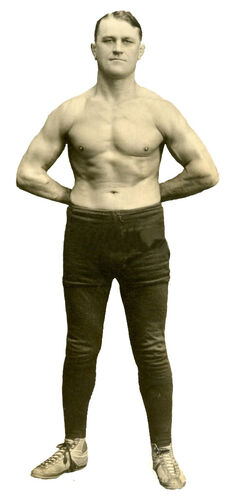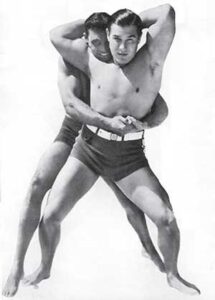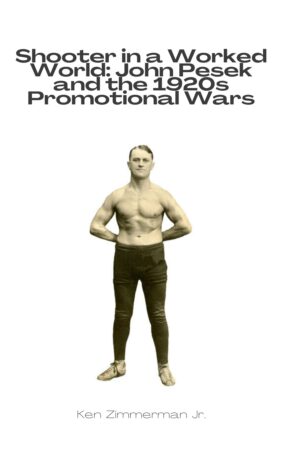Tsov txiv neej Tames Nat Pendleton
Nyob rau hauv 1922, New York promoter Jack Curley khiav afoul ntawm tus kub Dust Trio, Tus thawj tswj Billy Sandow, Ntiaj teb Heavyweight Wrestling tau zus ib Ed “Strangler” Lewis thiab wrestler/promotional genius Joseph “Toots” Mondt. Tus Trio tshuaj lub ntiaj teb championship thiab khov Curley tawm hauv booking tus tau zus ib.
Tau txawm nrog cov Trio, Curley began aggressively promoting Olympic wrestling silver medalist and collegiate champion Nat “Panther” Pendleton as the real world champion. Curley demanded Lewis wrestle Pendleton or forfeit his championship.

Photo of John Pesek from the Public Domain
Billy Sandow pointed out Pendleton was a relative novice as professional and needed to beat a contender to prove his worth. While American professional wrestling matches were all “ua haujlwm” by this time, it was understood by all parties Pendleton would be wrestling for real in his match with the contender and in future matches with Ed “Strangler” Lewis.
While Lewis was a capable “hooker”, los yog skilled submission wrestler, a legitimate wrestling match with Pendleton could go either way. As none of the Trio wanted to lose control of the World Heavyweight Wrestling Championship, they decided to call in another “hooker” to try and stop Pendleton before he got started.
John “tsov” Pesek was born in Ravenna, Nebraska on February 24, 1894. Only a year older than Nat Pendleton, Pesek has 7 more years of professional experience. Pesek entered professional wrestling in 1914 tom 20 xyoo.
Pesek was chosen because he disliked the “ua haujlwm” nature of professional wrestling and would sometimes turn his matches into “yub” los yog tseeb txojkev. Pesek had also handled Marin Plestina, another legitimate wrestler, in a shoot contest in 1921. Pesek viciously fouled Plestina. Pesek so dominated the contest, which he lost by disqualification that Plestina’s promoter Tex Rickard stopped promoting professional wrestling.

Photo of Columbia University wrestler and Olympic silver medalist Nat Pendleton (Public sau)
Tus Boston Post declared the Pesek-Pendleton match would be a “tua” rau ib tug $7,000 hnab tawv pojniam. The match occured at the Boston Grand Opera House on January 25, 1923. To win, Pesek had to pin Pendleton twice in 75 feeb. If Pendleton could avoid being pinned, Pendleton would win the match. Promoter Paul Bowser, aligned with Gold Dust Trio, probably agreed to this arrangement to convince Curley to allow Pendleton to take part in the match.
Pendleton entered the ring weighing 202 phaus. Pesek was the lighter man at 190 phaus. More than 3,000 fans showed up to watch the match between Pesek and Pendleton. “Cyclone” Burns was the referee for the contest.
Pesek set out at once to injure Pendleton, who started out defensively as Pendleton only needed to avoid being pinned to win. Pesek pushed Pendleton towards the ropes to start the match. After getting behind him, Pesek secured a double wrist lock. The double wrist lock can damage the elbow and shoulder joint but Pendleton was able to escape the move. Pesek secured a second double wrist lock but Pendleton pulled his arm away again. He wouldn’t fair as well against Pesek’s toehold.
Pesek used the threat of a takedown to spin to Pendleton’s back. After a trip, which put Pendleton on his stomach, Pesek secured Frank Gotch’s hold on Pendleton’s right leg at the 35 feeb kos. Pendleton quickly submitted by yelling, “Stop. Stop.” Txawm li cas los, with leg locks, you don’t feel the pain a lot of times until damage has actually been done to the leg. Pendleton submitted quickly but not before suffering an ankle injury.
The men resumed wrestling after the 10-minute intermission but the match was pretty much over. Pendleton could barely move on his badly sprained right ankle. Seeing Pendleton’s injured condition, Pesek picked him up and slammed him down on his side. The impact severely injured Pendleton’s arm.
Unable to use two limbs, Pendleton was helpless to prevent Pesek from securing a second toehold. With barely 5 minutes passed, Pesek submitted Pendleton a second time.
After a few months recovery, Pendleton returned to wrestling but only wrestled another year. He would transition from wrestling to acting in 1924 and spend the rest of his career in Hollywood.
Paul Bowser and the Gold Dust Trio were grateful for Pesek’s effort. Txawm li cas los, his propensity to “tua” on his opponents during matches made them reluctant to book Pesek for fear “he would go into business for himself”. Pesek would wrestle on and off until 1956 but made most of his money as a greyhound racing dog breeder.
Koj yuav tawm ib saib los nug cov lus nug txog qhov no los yog tej tsev xa rau kuv Facebook phab.
Qhov chaw: Boston Globe, Lub ib hlis ntuj 25, 1923 edition and January 26, 1923 ib tsab.
Pin It

